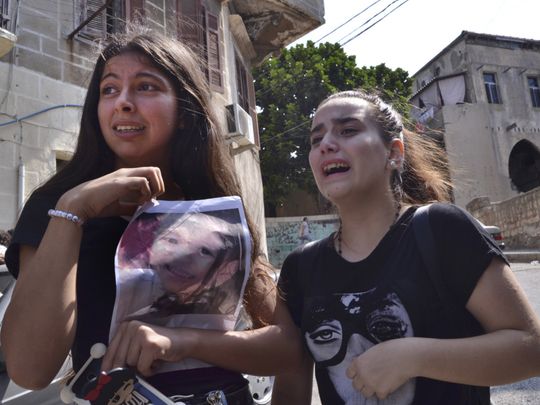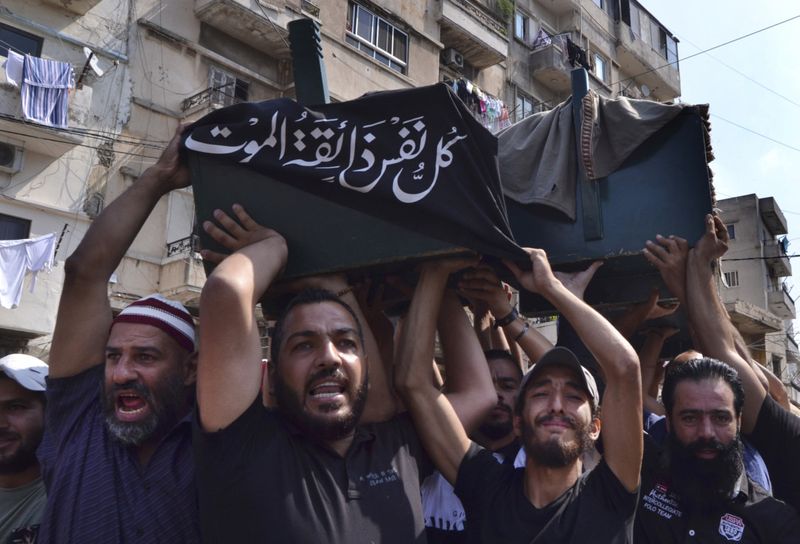
Tripoli, Lebanon - For years, Ibrahim Lisheen watched as refugees from neighbouring Syria passed through this Mediterranean port city, boarding smugglers’ boats for risky crossings to Europe. For Lebanese like him, it was an act of desperation to be pitied, not copied.
Until now. Earlier this month, Lisheen, 22, sold his furniture and paid to board an open fishing boat on a promise of safe passage to Cyprus, just 10 hours away. He was part of a new wave of migrants fleeing Lebanon’s own serial catastrophes: a collapsed economy, political unrest and the devastation wrought by a massive warehouse explosion in Beirut last month.
But as newcomers to this black-market transport, the Lebanese have encountered a grisly learning curve. Some boats have become lost or caught in storms, requiring rescues at sea. Frantic families have had no word from sons and husbands who set off from Lebanon’s rocky coast, leaving relatives to assume the worst. And in the most harrowing cases, the Lebanese have been easy prey for smugglers who take their money and leave them to die.
Lisheen and dozens of others on his boat drifted for more than a week after a promised rendezvous with a guide boat supposedly filled with provisions never materialized. He watched helplessly as desperation and death overtook his fellow passengers, starting with a toddler who died in his father’s arms.
“They are well aware of the horrible situation in Lebanon right now,” Lisheen said of the smugglers. “People are just desperate, and they are using this to their advantage.”
Lisheen was back in his Tripoli neighbourhood, his face and arms covered with bites and abrasions from three days that he said he spent floating at sea before a UN patrol boat picked him up. He had left the boat to swim for help.
“Either here or at sea, I am dead,” he said.
Hardship is nothing new in Lebanon, a country racked by decades of conflict. But even the chaos-weary Lebanese are shocked that conditions have become so hopeless that their fellow citizens are joining the treacherous migration across the Mediterranean that is typically associated with refugees from the region’s failed states.
Lisheen, who said he hasn’t had a job in five years, is part of an unemployment wave that topped 35 percent in the months since the coronavirus pandemic took hold here. Protests over government corruption have rocked the country for more than a year. And Hezbollah, which is both a militant group and political party, has engaged in military exchanges with Israeli forces across the southern border.
The Lebanese lira had already lost close to 80% of its value when 2,700 tons of improperly stored ammonium nitrate exploded at the Beirut port on Aug. 4, killing at least 200 people, bringing down the government and plunging the country deeper in crisis.
The hopelessness is felt nowhere more than in Tripoli, Lebanon’s second-largest city and a gritty coastal enclave where up to 80 per cent of families live in poverty. Those deciding to flee have made the city’s waterfront a new departure point.
The United Nations High Commissioner for Refugees said a spike in attempts to reach Cyprus began in late August, with at least 18 boats carrying potentially hundreds of people putting to sea from Lebanon. That is one vessel more than all the migrant boats known to have left Lebanon last year, the agency said, and those were filled almost entirely by Syrian refugees.
The agency has stepped up efforts to spread word in Tripoli’s poor communities about the trip’s dangers. And while departures paused following the ill-fated attempt of Lisheen’s group, dubbed the “death boat” in local media, officials do not expect the lull to last.
“As we have seen in other countries, it is likely that conditions in Lebanon mean we will see other attempts,” said UNHCR spokeswoman Lisa Abou Khaled.

Arafat Khalid Yassin, a 25-year-old from Tripoli, has already tried twice to cross to Cyprus, most recently at the beginning of this month. One his friends died in Lisheen’s boat and another is missing. But Yassin is planning to try again; his mother has forbidden him to take his 20-month-old daughter.
“It is better to die at sea trying to leave than live a life of poverty and starvation in Lebanon,” he said.
Several boats have reportedly been stopped by Lebanese or Cypriot naval patrols, with passengers returned before their potential claims for asylum could be heard. One group of migrants that reached Cyprus told reporters they were promised to be taken on to Italy only to find themselves returned to a pier outside of Beirut.
“We are concerned about reports that a number of boats that have attempted to reach Cyprus have been pushed back to Lebanon and that some new arrivals have been denied access to asylum procedures,” said Shabia Mantoo of UNHCR’s Geneva headquarters. “We’ve brought our concerns to the Cypriot authorities.”
An official at the Cypriot Embassy referred questions to Cyprus’s Foreign Ministry, which did not respond to a request for comment.
Lisheen hadn’t thought much about what might be waiting for him in Cyprus, where Lebanese who’d made it have set up WhatsApp groups to help new arrivals find housing and work. Nor did he know how dangerous the crossing could be when an acquaintance connected him with two Lebanese men who promised to get him on a boat.
He sold his refrigerator, a couch and his dishes to scrape together the 5 million-lira fee (about $3,300) and met several of his neighbours at the docks. It is unclear how many people ultimately crammed aboard the small craft, but Lisheen said he counted 47, half of them Lebanese and half Syrian.
The smugglers collected the passengers’ bags of clothing, food, water and phones and said it would all be carried in a second craft that would meet them a few miles offshore. No second boat ever appeared. For hours, and then days, they drifted without fuel in the searing sun.
Mohammad Sofian, 21, was aboard with his pregnant wife and 2-year-old son. Without water, his wife was eventually unable to nurse the boy. After agonizing days, they gave him seawater to drink. On the fourth day, he died.
“I wrapped him in clothing,” said Sofian, who is now back in Tripoli with his wife. “After a few days, I put him over the side.”
All the while, the smugglers were sending messages to the passengers’ families in Tripoli, assuring them that the trip was going well and sharing Google Earth images purporting to show the boat’s location.
“They were lying to our parents while we were dying at sea,” Sofian said.
Several men, including the boat operator, went over the side, hoping to swim for help. The boat operator has not been seen since, and it remains unclear whether he was aware of the smugglers’ plans. Lisheen swam and floated for days, stung by jellyfish, bitten by unknown sea creatures. On two occasions, he said, he tried to let himself sink to oblivion, only to find himself floating again.
On September 14, a Turkish frigate patrolling as part of the United Nations’ Lebanese peacekeeping force, UNIFIL, spotted the boat drifting about 23 miles off the Lebanese coast. On board were 36 people, including one dead woman and a child in critical condition, according to UNIFIL spokesman Andrea Tenenti.
A second UN ship dispatched to the area, an Indonesian frigate, spotted Lisheen floating unconscious.
As the ships steamed back toward Beirut, Sofian said he asked his rescuers to take them into custody, anywhere but the approaching coastline.
“I asked them to take me to jail,” he said, “just don’t take me back to Lebanon.”








